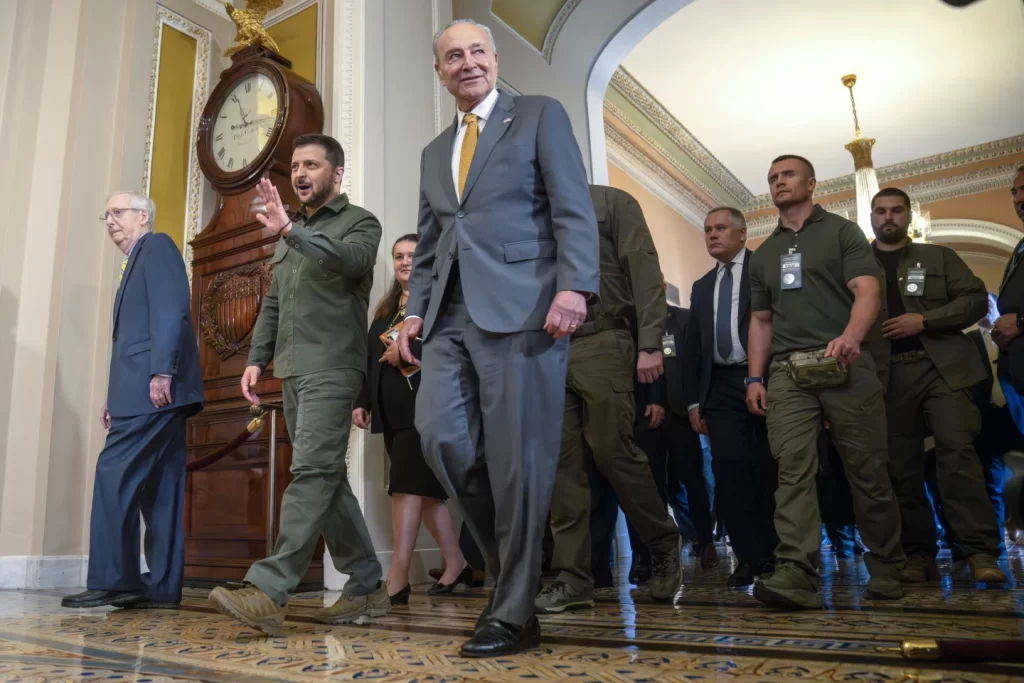
WASHINGTON — As the Senate wrapped up its work for the year, Sen. Michael Bennet took to the floor of the nearly empty chamber and made a late-night plea for Congress to redouble support for Ukraine: “Understand the stakes at this moment.”
It was the third time in recent months the Colorado Democrat has kept the Senate working late by holding up unrelated legislation in a bid to cajole lawmakers to approve tens of billions of dollars in weaponry and economic aid for Ukraine. During a nearly hour-long, emotional speech, he called on senators to see the nearly 2-year-old conflict as a defining clash of authoritarianism against democracy and implored them to consider what it means “to be fighting on that freezing front line and not know whether we’re going to come through with the ammunition.”
Yet Congress broke for the holidays and is not expected to return for two weeks while continued aid for Ukraine has nearly been exhausted. The Biden administration is planning to send one more aid package before the new year, but says it will be the last unless Congress approves more money.
With support slipping in Congress even as conflicts and unrest rattle global security, the United States is once again struggling to assert its role in the world. Under the influence of Donald Trump, the former president who is now the Republican Party front-runner, GOP lawmakers have increasingly taken a skeptical stance toward U.S. involvement abroad, particularly when it comes to aid to Ukraine.
Ukraine’s lifelines to the West are also imperiled in the European Union, which sent 1.5 billion euros ($1.6 billion) each month to ensure macroeconomic stability, pay wages and pensions, keep hospitals and schools running, provide shelter for displaced people and rebuild infrastructure destroyed in the war.
That package has now expired and the EU’s executive branch failed to produce another one for the new year when Hungary vetoed a 50 billion euro ($55 billion) package this month.
Bolstering Ukraine’s defense used to be celebrated in the U.S. Capitol as one of a few remaining bipartisan causes. But now the fate of roughly $61 billion in funding is tied to delicate policy negotiations on Capitol Hill over border and immigration changes. And in the last year, lawmakers have had to mount painstaking, round-the-clock efforts to pass even legislation that maintains basic functions of the U.S. government. Bills with ambitious changes have been almost completely out of reach for the closely divided Congress.
Still, congressional leaders are trying to rally members to address global challenges they say are among the most difficult in decades: the largest land invasion of a European nation since World War II, a war between Israel and Hamas, unrest and economic calamity driving historic levels of migration and China asserting itself as a superpower.
In the Senate, both Democratic and Republican leaders have cast the $110 billion aid package, which is attempting to address all those issues, as a potential turning point for democracy around the world. Senate Majority Leader Chuck Schumer told reporters last week that “history will look back if we don’t support our ally in Ukraine.”
“We’re living in a time when there are all kinds of forces that are tearing at democracy, at here and abroad,” Bennet said.
In a year-end speech, Senate Republican Leader Mitch McConnell said: “From South Texas to Southeast Asia and from the Black Sea to the Red Sea, it is an historically challenging and consequential time to protect America’s interests, our allies and our own people.”
The Republican leader, a key supporter of Ukraine aid, has tried for months to build support in his party for Ukraine. But after a $6 billion military and civilian aid package for Ukraine collapsed in October, McConnell began telling top White House officials that any funding would need to be paired with border policy changes.
The White House deliberately stayed out of the negotiations until senior officials felt the time was right to do so. But senior Republicans involved in the border talks believe the administration stepped in too late, ultimately delaying the prospects of additional Ukraine aid getting approved until the new year.
Senate negotiators have had to navigate both the explosive politics of border policy as well as one of the most complex areas of American law.
“This is a tightrope, but we are still on it,” said Sen. Chris Murphy, the lead Democratic negotiator.
At one point during the negotiations, McConnell felt compelled to stress the urgency to administration officials and impose a deadline to reach a border deal in time for the agreement to be drafted into legislative provisions before the end of the year.
With the negotiations still plodding along, McConnell called White House chief of staff Jeff Zients on Dec. 7 and said a deal must be reached within five days — a message that the Kentucky Republican emphasized to President Joe Biden himself when the two men spoke later that day, according to a person familiar with the discussions.




